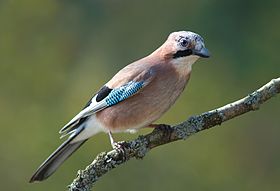Phân thứ bộ Quạ
Giao diện
| Phân thứ bộ Quạ | |
|---|---|

| |
| Quạ thông Á Âu (Garrulus glandarius) | |
| Phân loại khoa học | |
| Vực: | Eukaryota |
| Giới: | Animalia |
| Ngành: | Chordata |
| Lớp: | Aves |
| Bộ: | Passeriformes |
| Phân bộ: | Passeri |
| Phân thứ bộ: | Corvides |
| Các nhánh | |
|
Campephagidae | |
Phân thứ bộ Quạ (danh pháp khoa học: Corvides) là một nhánh chim thuộc bộ Sẻ (Passeriformes).[1] Corvides trước đây được coi là Corvoidea lõi,[2] nhưng lịch sử tiến hóa, địa sinh học, hành vi và hình thái sinh thái của Corvides đã được nghiên cứu rộng rãi.[3][2][4][5][6][7][8][9][10] Corvides dường như đại diện cho một nhánh bức xạ thích nghi, khi chúng xuất hiện ở tất cả các lục địa ngoại trừ Nam Cực.[11]
Phân loại học
[sửa | sửa mã nguồn]Corvides bao gồm các họ sau đây:[12][2]
- Cinclosomatidae
- Mohouidae
- Neosittidae
- Liên họ Corvoidea
- Liên họ Malaconotoidea
- Liên họ Orioloidea
Tham khảo
[sửa | sửa mã nguồn]- ^ McCullough, J.M. et al. (2022) Wallacean and Melanesian Islands Promote Higher Rates of Diversification within the Global Passerine radiation Corvides. Systematic Biology, syac044, https://doi.org/10.1093/sysbio/syac044
- ^ a b c Jønsson K.A., Fabre P.-H., Kennedy J.D., Holt B.G., Borregaard M.K., Rahbek C., Fjeldså J. (2016) A supermatrix phylogeny of corvoid passerine birds (Aves: Corvides). Mol.Phylogenet. Evol. 94:87–94.
- ^ Jønsson K.A., Fabre P.-H., Ricklefs R.E., Fjeldså J. 2011. Major global radiation of corvoid birds originated in the proto-Papuan archipelago. Proc. Natl. Acad. Sci. U. S. A. 108:2328–2333.
- ^ Jønsson K.A., Borregaard M.K., Carstensen D.W., Hansen L.A., Kennedy J.D., Machac A., Marki P.Z., Fjeldså J., Rahbek C. (2017) Biogeography and Biotic Assembly of Indo-Pacific Corvoid Passerine Birds. Annu. Rev. Ecol. Evol. Syst. 48:231–253.
- ^ Marki P.Z., Fabre P.-H., Jønsson K.A., Rahbek C., Fjeldså J., Kennedy J.D. (2015) Breeding system evolution influenced the geographic expansion and diversification of the core Corvoidea (Aves: Passeriformes). Evolution. 69:1874–1924.
- ^ Kennedy J.D., Borregaard M.K., Jønsson K.A., Holt B., Fjeldså J., Rahbek C. (2017) Does the colonization of new biogeographic regions influence the diversification and accumulation of clade richness among the Corvides (Aves: Passeriformes)? Evolution. 71:38–50.
- ^ Kennedy J.D., Borregaard M.K., Jønsson K.A., Marki P.Z., Fjeldså J., Rahbek C. (2016) The influence of wing morphology upon the dispersal, geographical distributions and diversification of the Corvides (Aves; Passeriformes). Proceedings of the Royal Society B: Biological Sciences. 283:20161922.
- ^ Kennedy J.D., Borregaard M.K., Marki P.Z., Machac A., Fjeldså J., Rahbek C. (2018) Expansion in geographical and morphological space drives continued lineage diversification in a global passerine radiation. Proceedings of the Royal Society B.
- ^ Kennedy J.D., Marki P.Z., Fjeldså J., Rahbek C. (2020) The association between morphological and ecological characters across a global passerine radiation. J. Anim. Ecol. 89:1094–1108.
- ^ Kennedy J.D., Marki P.Z., Fjeldså J., Rahbek C. (2021) Peripheral eco‐morphology predicts restricted lineage diversification and endemism among corvoid passerine birds. Glob. Ecol. Biogeogr. 30:79–98.
- ^ Aggerbeck, M., Fjeldså, J., Christidis, L., Fabre, P.-H., Jønsson, K.A., (2014) Resolving deep lineage divergences in core corvoid passerine birds supports a proto407 Papuan island origin. Molecular Phylogenetics and Evolution 70, 272–285.
- ^ Gill, F., M. Wright, & D. Donsker. (2010) IOC World Bird Names, version 2.7.
